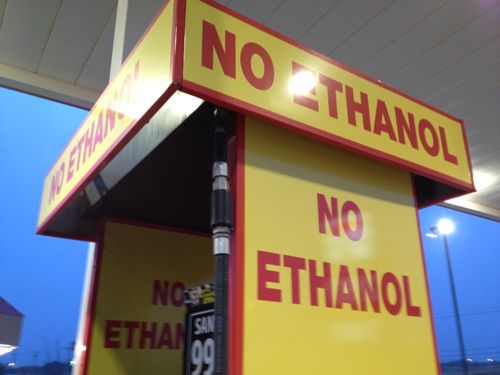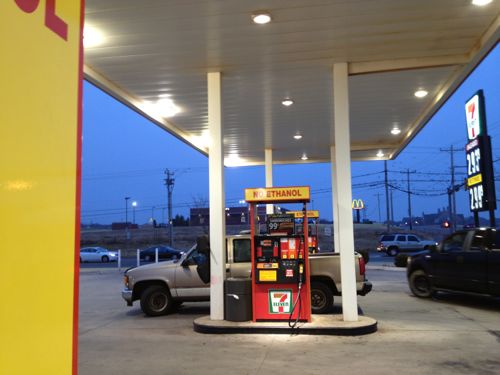No Ethanol
I haven’t written about the gasoline vs ethanol debate since 2008 (100% Gas Sold Here) but I was reminded again in Oklahoma last week. My brother wanted to make sure we could get gasoline instead of “alcohol.” He was buying the fuel for the rental car so I didn’t question it.

Pure gasoline advocates say the vehicle runs better and goes farther on a gallon. Gasoline in St. Louis is actually E10 or E15, a blend of mostly gasoline with some ethanol, aka gasohol.
Ethanol is an alcohol-based fuel made by fermenting and distilling starch crops, such as corn. It can also be made from “cellulosic biomass” such as trees and grasses. The use of ethanol can reduce our dependence upon foreign oil and reduce greenhouse gas emissions.
E10 (gasohol)
E10 (also called “gasohol”) is a blend of 10% ethanol and 90% gasoline sold in many parts of the country. All auto manufacturers approve the use of blends of 10% ethanol or less in their gasoline vehicles. However, vehicles will typically go 3–4% fewer miles per gallon on E10 than on straight gasoline. (fueleconomy.gov)
The rental car was actually a GM flex fuel vehicle so we could’ve filled up with E85.

Ethanol is touted as a reducing pollution as well as being domestically produced, reducing dependance on foreign oil. The 100% gasoline costs a bit more per gallon, but again you can go farther on each gallon. Thoughts?
— Steve Patterson
US ethanol is made from corn. While burning ethanol creates less greenhouse gases than burning oil, using ethanol actually INCREASES overall greenhouse gas emissions, because farming corn uses a large amount of energy. In fact, you have to burn more energy to make corn ethanol than you get in the ethanol, so the only reason it exists is due to government subsidies to corn farmers. Not only does US ethanol do nothing to prevent global warming, but there is evidence that ethanol damages car engines, and it raises world food prices causing large numbers of people in the third world to starve. But despite all these disadvantages, the first presidential primaries are held in Iowa (and New Hampshire), and Iowa is a big corn state, so the subsidies will never be ended.
Eric, I disagree with some of your numbers and your ideas. It does not cost more to produce a gallon of ethanol than gasoline. It is closer to to $1.75 to make 1G. You would also have to add the cost of gasoline supply being lower if the ethanol was not used. The cost of pure gas would be 15-20% higher, which almost all that money would be leaving the US. As for damaging car engines. New cars are made to run with E-Fuel. Older cars burn the fuel faster, however I have never seen any evidence that it damages the engines. When talking about global warming I don’t know what numbers you look at. Sure if the land was pure, solid forest it would be better, but that would never happen. Corn crops do produce CO2. I don’t know how producing CO2 is worse than burning a fossil fuel.
When Eric talks about energy and emissions to produce the corn, it’s about running tractors, producing and applying fertilizers, harvesting the corn, processing the corn, etc., not plant CO2 emissions.
But I agree with you about engine wear – they’re designed to accept it.
The biggest secret that ethanol producers don’t want us to know is the reduction in MPG with E85. You see the dramatically different price at the pump, but after you have to fill up more often, the savings surely are negligible at best.
The $1.75 is the total cost from start to finish. The difference from the emissions of production of corn ethanol and fossil fuel is that the corn growing does produce CO2 to cover the emissions from the machinery, while fossil is pure emission with no CO2 recovery.
E85 can be cheaper than gasoline, depending on market conditions, but that is only due to subsidies. However, the miles per dollar are far below gasoline as there is less energy in Ethanol. Conversely, when looking at commuter vehicles, diesel is often more expensive than gasoline, however, the miles per dollar of fuel are generally better than gasoline. The break even point takes a while, as diesel engines cost more up front, but if you drive a lot, diesel makes a lot of sense.
I live in Iowa, I drive a 12 year old Focus station that I bought when brand new and have consistently gotten an _honest_ overall 28mpg on gasohol (also called “mid-grade”). I buy that because it always is the lowest price fuel offered.
In all honesty, down at my level the arguments about social implications of corn being used for fuel vs food, the hidden costs of the fuel used to make the gasohol, or that subsidies is why it is cheaper, have no effect on my choice of purchase.
Those political and marketing decisions have already been made well above me and my only decision is of which button to press on the pump when I fill the Focus. Because I am retired, that is generally only about once every 4-5 weeks except when we travel perhaps 2-3 trips per year. Gasohol is worth it for me.
Another spin on ethanol: certain small engines, especially efficient engines such as found on inverter generators, can not tolerate ethanol. I found this out after ethanol gummed up mine, requiring expensive repairs. I don’t mind it in my car, but ethanol has made my generator useless until it’s converted to LP/NG which is not cheap either.
“Using food to run cars is dumb” – Charles T Munger
If it’ll work in my engine, I buy whatever is cheapest. I do have problems with heavily subsidizing domestic ethanol production while severely limiting imports of ethanol or feed stocks like sugar. Government should not be picking winners and losers in business!
Not only that, but it’s effectively illegal to sell non-ethanol. Yes, there are some squirrely ways around it with premium blends, but it’s not easy. Hence, there are no gas stations in St. Louis where I can get real gas that won’t gum up a small engine.